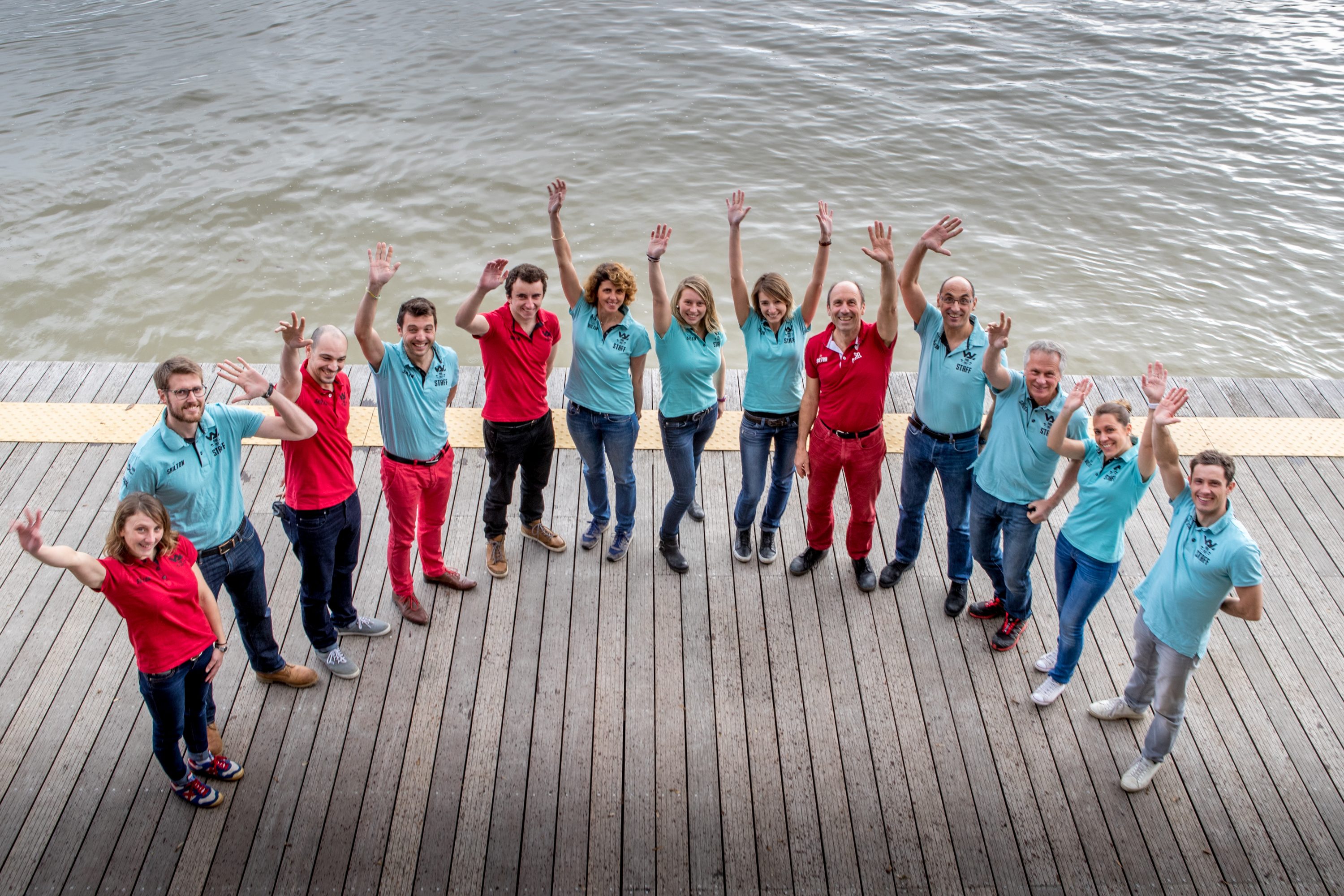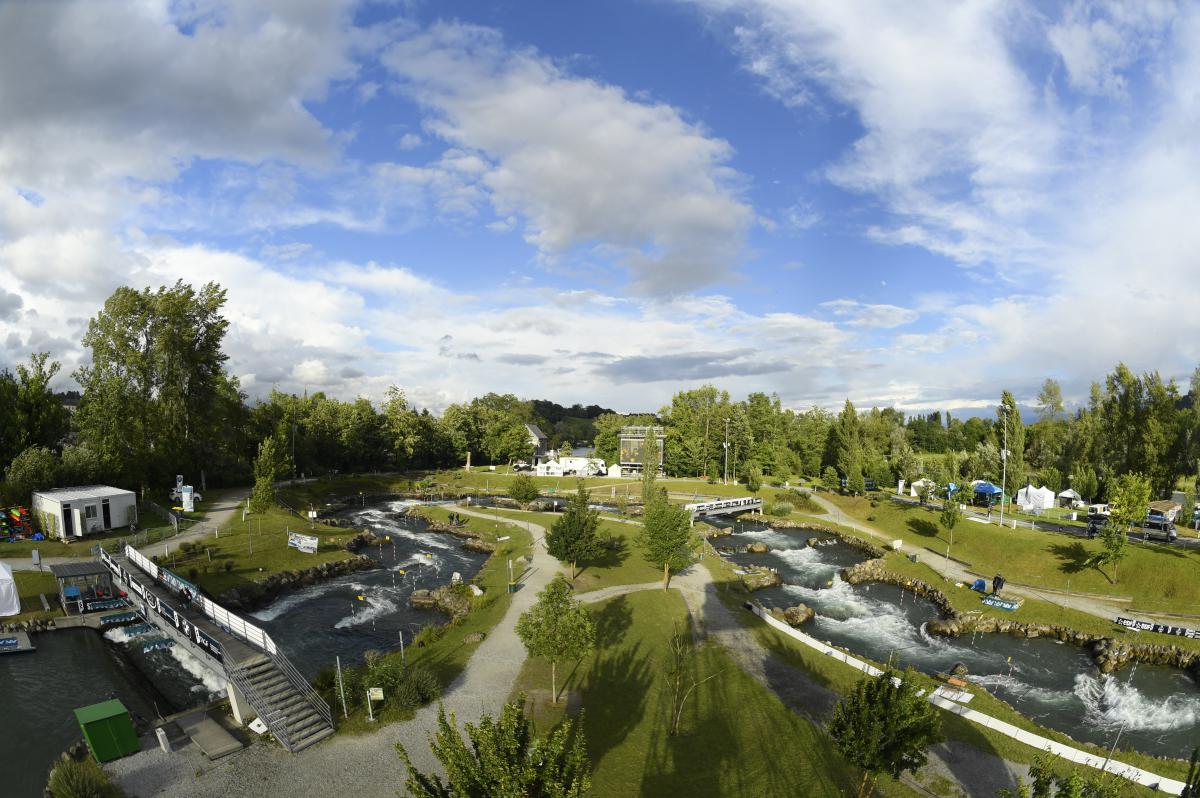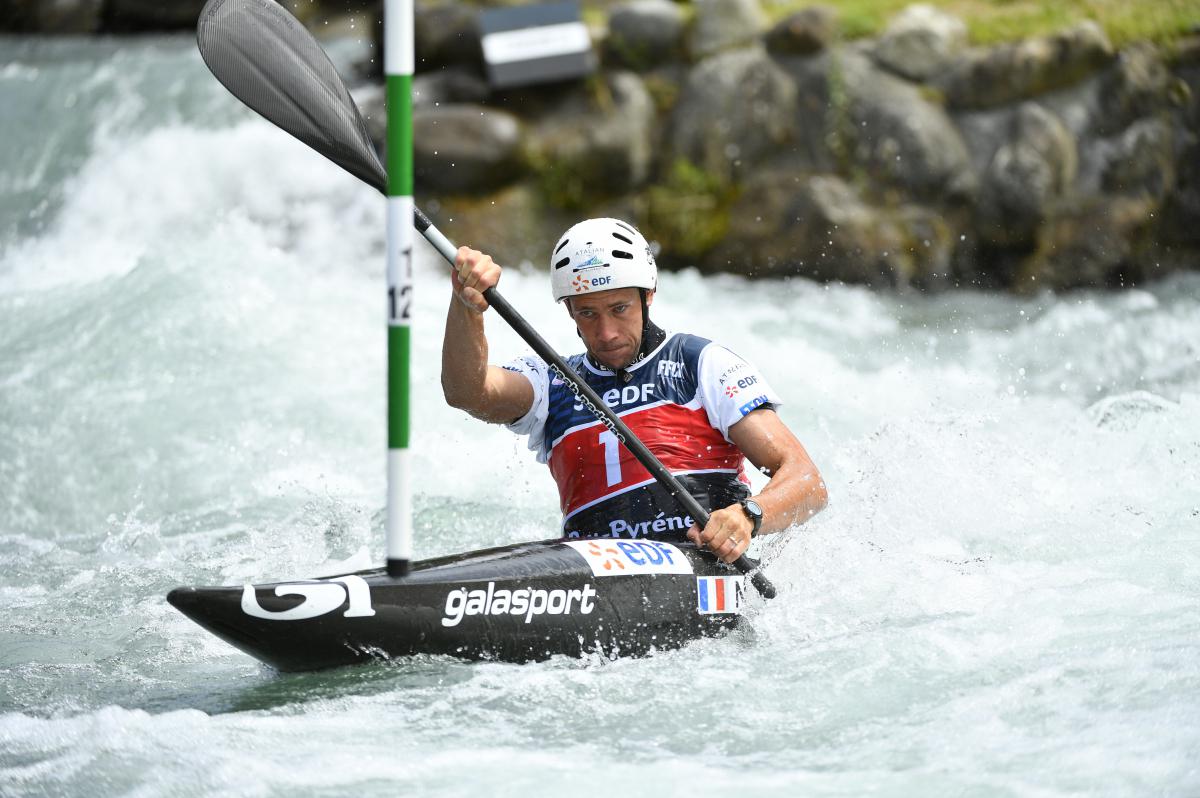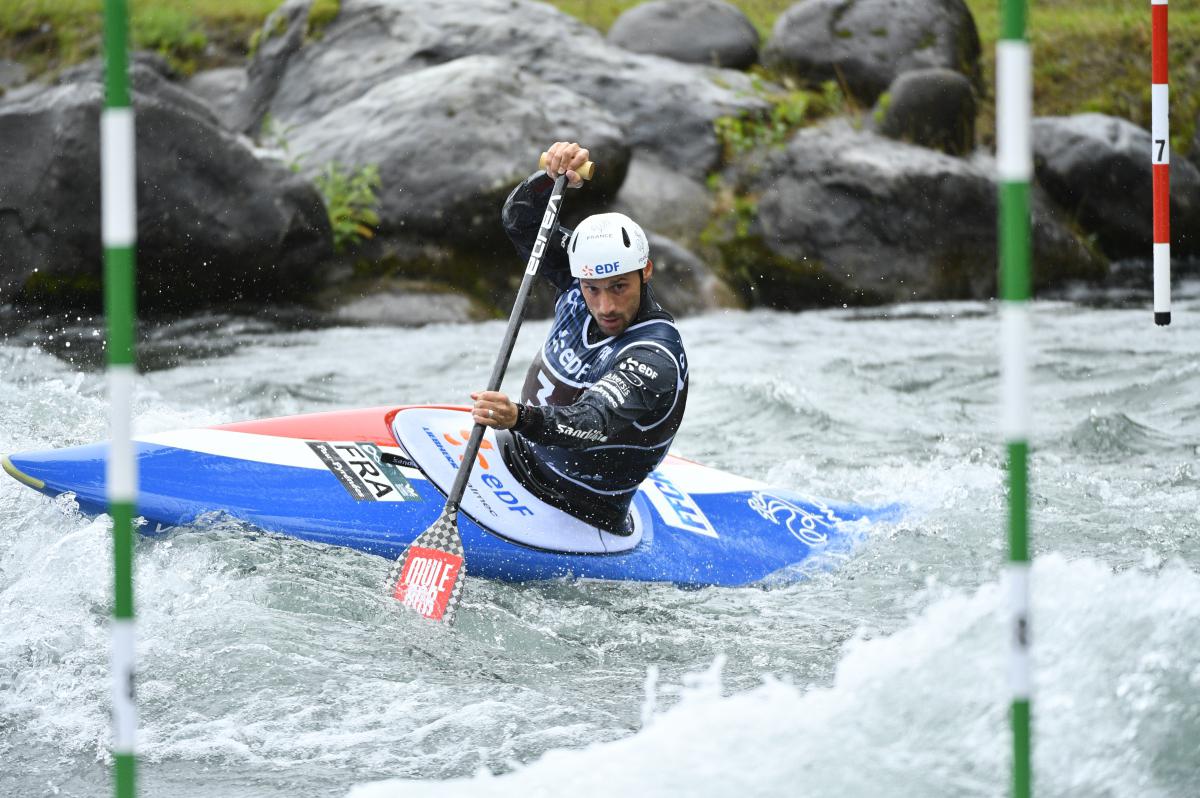Pau se jette à l’eau
Du 23 sept. au 1er oct., l’Agglomération Pau Béarn Pyrénées et la Fédération Française de Canoë-Kayak s’associent pour accueillir les Championnats du Monde de Canoë-Kayak au Stade d’Eaux Vives Pau-Pyrénées. Une première à Pau et la promesse d’une grande fête sportive !
On pense immédiatement à l’eau vive de la chanson qui court et danse… Il est 9 h du matin. Le Stade d’Eaux Vives Pau-Pyrénées semble étonnamment calme. Mais en amont du Gave, dans des bâtiments éphémères qui font office de PC technique, une équipe de choc s’affaire déjà. Il faut dire que l’enjeu est de taille. Pau accueille cette année les Championnats du Monde de Canoë-Kayak. Les premiers Mondiaux d’une discipline olympique en Nouvelle-Aquitaine. Les premiers aussi à proposer, la même semaine, et sur le même lieu, les épreuves de Descente Sprint et de Slalom dans le même bassin. Les premiers, enfin, à titrer le Slalom Extrême. Co-organisé par la Fédération Française de Canoë-Kayak et l’Agglomération paloise, l’événement est soutenu et relayé par le plus célèbre portedrapeau de la discipline, palois de surcroît et triple champion Olympique, Tony Estanguet. Plus qu’une référence. « Je me suis engagé sur ce projet en 2013, bien avant que je sois sollicité pour la candidature de Paris aux JO 2024. Porter ce projet, c’était une évidence. C’est mon sport, ma ville, le club où j’ai ma licence depuis 1983. C’est ici que mon père m’a mis à l’eau, c’est ici que j’apprends ce sport à mes enfants. »Une histoire de famille et de passion. « Nous avons fait le choix d’un projet ambitieux, sportivement et au-delà. Nous bénéficions d’un site exceptionnel ouvert sur la ville et d’un bassin rapide et spectaculaire » ajoute le président du comité d’organisation. Un stade très technique, qui permet une vraie proximité entre les bassins et les spectateurs, avec le Château à quelques encablures. La carte postale devrait convaincre. Alors pour l’ex-athlète qui a posé la pagaie de compétition en 2012, ce rendez-vous est l’occasion rêvée d’oeuvrer pour la cause du sport nature en milieu urbain, une idée qui lui tient à cœur.
Du spectacle sur
l’eau et hors de l’eau
Mais il veut aussi aller plus loin.
« Ce qui m’animait dans le projet, c’est le côté festif, grand public. Au-delà de la mise en lumière du sport, ce Championnat est l’occasion de créer un événement festif et chaleureux. »
Au programme, des concerts, des animations, des casetas, des démonstrations, des initiations, le Mondial version coulisses se veut ouvert et convivial, « avec l’ambition de marquer les esprits, de laisser une trace, de proposer une expérience globale et un héritage durable à la ville et au territoire » conclut celui qui est aussi co-président de Paris 2024. Alors bien sûr si la capitale est élue par le CIO le 13 septembre pour l’organisation des JO, la fête n’en sera que plus belle à Pau qui bénéficiera alors d’une caisse de résonance supplémentaire.
Le compte à
rebours est lancé
Dans le bureau du comité d’organisation, c’est l’effervescence qui domine. Un immense rétroplanning collé au mur donne le ton. La pression, l’équipe sait la gérer. Elle a déjà préparé une épreuve de Coupe du Monde en 2015 et 2016 sur le site. Sang froid et rigueur prévalent. Des qualités que connaît bien Marianne Agulhon, coordinatrice sport de l’événement, ex-kayakiste de haut niveau, 5e des JO de Barcelone. Elle veille à l’accueil des sportifs et des officiels, soit près de 800 personnes et 65 nations représentées. Pôles techniques, village, organisation avec les juges, réglementation, contrôle anti-dopage ou sécurité, elle ne laisse rien au hasard. Son mémo de travail aligne trois mots-clés en permanence : technique, sécurité et environnement. Son expérience du haut niveau l’aide à être polyvalente. « On a un objectif et on met tout en place pour l’atteindre, avec rigueur. » Sans oublier une volonté de pédagogie qu’elle affiche avec conviction. « On mène un programme de développement international du canoë-kayak, en particulier du canoë-kayak féminin. Le canoë-kayak, c’est 40 000 licenciés permanents en France, 5 millions de pratiquants occasionnels dont plus de 1 million en Nouvelle-Aquitaine. Il faut poursuivre et faire découvrir ce sport au plus grand nombre » ajoute-t-elle. Sur Pau, plusieurs écoles ont déjà bénéficié d’une initiation. Il faut dire qu’avec ses 300 licenciés, le club béarnais est l’un des plus dynamiques de la Fédération. Quant au Stade d’Eaux Vives, il accueille toute l’année le Pôle Espoir et les sélections nationales. Un collectif de 45 athlètes du Pôle France s’entraînera in situ avant l’épreuve. Ce temps de préparation est ouvert au public. « Nous voulons mettre en avant les valeurs de notre sport » ajoute Marianne Agulhon. « Un sport de nature, que l’on peut pratiquer à tout âge et qui offre, depuis l’eau, un autre regard sur la ville mais aussi sur la faune, la flore et le patrimoine. Un sport qui alterne trois milieux – eau vive, eau calme et mer – et peut se pratiquer sur des rivières mythiques. Un sport de glisse et de sensation, à l’instar du ski ou du surf et dont l’origine remonte aux Indiens et aux Esquimaux. L’approche “aventure” n’est jamais très loin ! Quand au respect de l’environnement, il fait partie de la pratique » renchérit celle qui s’occupe aussi du Pôle Espoir depuis 1997. « On a concocté un programme optimal pour la compétition mais aussi pour le spectacle » poursuitelle. Les volontaires y seront largement associés. Une centaine d’entre eux seront chargés de la préparation du bassin, de sa mise en conformité et de la sécurité des pagayeurs. Une armada de pros et de volontaires va se jeter à l’eau pour que Pau soit une fête ! Aucun détail n’est négligé pour y parvenir. Le podium en bois travaillé par des ébénistes de la Vallée d’Ossau est déjà en place. Il attend sagement ses champions. Et un large public pour les acclamer.
Denis Gargaud-Chanut,
la tête d’affiche
… L’expression vaut au propre et au figuré. Le visage de l’affiche, c’est lui. « Une fierté et un honneur » pour le médaillé d’or de Rio 2016 en Slalom. Le Marseillais connaît bien le site de Pau où il a pagayé six ans durant. « Ce n’est d’ailleurs pas forcément un avantage de connaître un parcours, car on a besoin d’être en alerte » précise le céiste, « mais concourir à Pau, c’est une opportunité fabuleuse qui ajoute de l’excitation. Je m’impose d’être irréprochable techniquement, après on verra si la saison confirme ! J’ai trente ans, l’âge de la maturité dans un sport qui requiert de l’expérience et une gestion de l’imprévu. » La mise en lumière avec Tony Estanguet le fait sourire. Si les deux hommes se sont souvent bagarrés en compétition, le plaisir de faire connaître leur sport au plus grand nombre les rapproche.
« Je suis flatté du fait qu’il y ait une transmission avec Tony et j’ai envie de faire partie de la fête. Il faut profiter de la lumière de Pau pour montrer qu’on pratique un sport de stratégie et d’adrénaline, un sport spectacle qui suscite des émotions fortes, y compris pour le spectateur, car ça peut basculer à tout moment. »
Alors bien sûr un titre à Pau aurait une saveur particulière…
Le mémo des spectateurs
- Le canoë se pratique à genoux, avec une pagaie simple, en solo, en biplace homme ou en mixte, une épreuve qui revient dans l’édition paloise du Championnat du Monde.
- Le kayak se pratique assis, avec une pagaie double, en solo.
- Chaque embarcation est différente en fonction de la discipline
- L’épreuve de Descente Sprint joue sur la vitesse ; le Slalom demande habilité et vitesse sur un parcours avec des portes.
- Dans ce stade artificiel, le débit sera porté à 12m3, contre 7m3 pour le grand public.
- 65 nations attendues, plus de 800 athlètes et staffs techniques.
Pau jumps in at the deep end
From 23rd September to 1st October, the Pau Béarn Pyrenees conurbation and the French Canoe and Kayak federation will join their forces to host the Canoe and Kayak World Championships at the Pau-Pyrenees White Water Stadium. A first for Pau that holds the promise of a great sporting celebration.
It’s nine o’clock in the morning and the Pau-Pyrenees White Water Stadium seems strangely calm. But upstream of the Gave, in the temporary buildings being used as a technical control station, an ultra-efficient team is already hard at work. Then again, what lies ahead is no small challenge; this year Pau is host to the Canoe and Kayak World Championships. The first international championships for an Olympic discipline to be held in Nouvelle-Aquitaine. It’ll also be the first edition where the Wildwater Sprint and Slalom events will also be held at the same venue in the same week, and the first to award an Extreme Slalom title. Co-organized by the French Canoe and Kayak Federation and the Pau conurbation, the event is supported and promoted by the most famous ambassador of the discipline, and, what’s more, a Pau-born man and triple Olympic champion, Tony Estanguet. He’s much more than just a sporting reference. “I got involved in this project in 2013, well before I was asked to contribute to the Paris bid for the 2024 Olympic Games. It was totally logical for me to back this project. It’s my sport, my city, the club I’ve been a member of since 1983. Pau is where my Dad helped me get started, and now I’m teaching my children here.” A story all about family and enthusiasm. “We chose to make it an ambitious project, in terms of sport and in all the other aspects too. We are lucky to have an exceptional site that opens out on the city, and a fast-flowing, spectacular course,” adds the President of the organization committee. A highly technical stadium, where the spectators can really get up close to the channels and the city Castle is just a few paddle lengths away. The picture postcard setting should be a hit. So, for the former athlete who hung up his competition paddle in 2012, this international event is a dream opportunity to promote open-air sports in an urban setting, a concept he’s particularly keen on.
The show is on the banks too
He wants to take things a bit further than that. “What I really like about this project is the party atmosphere that attracts the crowd. In addition to promoting canoeing and kayaking, the Championships are an opportunity to create a festive, people-friendly event.” On the programme, concerts, entertainment, casetas, demonstrations or “taster” sessions, the offstage version of the world championships is set to be fun and friendly, “with the aim of making the event something to be remembered, a great souvenir for people to take away with them, creating a global experience and sustainable heritage for the city and for the entire region” concludes the man who is also co-president for Paris 2024. So, if on September 13th, the IOC selects Paris as host city for the Olympic Games, then there’ll be a double celebration in Pau, which will benefit from a positive, knock-on effect.
It’s the final countdown
The Organisation Committee’s offices are a hive of activity. The massive count-down schedule pinned to the wall sets the scene. The team knows how to handle pressure; they prepared the World Cup events at the stadium in 2015 and 2016 and know that level-headedness and methodical work are essential. Qualities only too familiar to Marianne Agulhon, the event’s sports coordinator, former professional kayaker and 5th at the Barcelona Olympic Games. She oversees the welcome formalities for the athletes and officials – around 800 people representing 65 different countries. Technical hubs, exhibition village, organization with the judges, regulations, doping controls, safety and security, she leaves nothing to chance. Her work mantra contains three words: technique, safety and environment, and her professional experience helps her turn her hand to anything. “We have an aim, and we pull out all the stops to make sure we get there, with discipline and organization.” Not forgetting an educational aspect she firmly believes in: “we have an international canoe-kayak programme, promoting women’s canoe-kayaking in particular. The sport has 40,000 full-time licenced members in France, five million who do it as a leisure activity, including around a million of them in Nouvelle-Aquitaine. We have to continue promoting the sport to make it accessible to as many people as possible,” she adds. In Pau, several schools have already taken part in beginner sessions, and with its 300 licenced members, the Bearn-based club is one of the most thriving clubs in the Federation. The Whitewater Stadium itself is used by the national under-21s all year round and for national team selections. A cohort of 45 athletes from the French national team will come to train upstream of the event, when the stadium will be open to the public. “We want to promote the values of our sport” adds Marianne Agulhon. “It’s an outdoor sport that anyone can do and from the water you have a totally different perspective on the city, its heritage and natural wildlife. It’s a sport where three settings alternate – whitewater, flatwater and seawater – and you can paddle down some of the world’s legendary rivers. An action sport, pumped full of adrenalin, like skiing or snowboarding, that first appeared in the Indian and Inuit populations. The “adventure” aspect is never far away! And being environmentally-friendly is all part of the game” emphasises Marianne, who has also been training the under-21 squad since 1997. “We’ve drawn up a programme that is perfect for both the competition and entertainment,” she explains. Volunteer workers will also have a significant role to play. Around a hundred of them will be responsible for preparing the watercourse, making sure it conforms to regulations, and for ensuring the athletes’ safety. A veritable army of professionals and volunteers are going to take the plunge to make sure that Pau becomes one big party, right down to the finest details. The wooden podium sculpted by cabinet makers from the Ossau Valley is already in place, patiently awaiting the medallists, and a huge crowd to cheer them on.
Denis Gargaud-Chanut, the hot favourite
Denis is featured in action on the poster for the championships. “I’m really proud, it’s a great honour” says the Rio 2016 gold-medallist in the Slalom race. This man from Marseille knows the Pau site well, as he spent six years paddling here. “Actually, it’s not always an advantage to know a race course, because you always need to be on the alert” explains the canoeist, “but competing in Pau is a fabulous opportunity that adds to the adrenalin rush! I don’t allow myself the slightest mistake in my technique, and I guess we’ll soon see if the season reflects that! I’m thirty now, the age of maturity in a sport that requires experience and the ability to manage the unexpected.” Being featured alongside Tony Estanguet makes him smile, because even though the two men have often fought it out in competitions, the enjoyment they get out of promoting their sport to the general public brings them together. “I’m really flattered to be taking over where Tony left off and I really want to be part of the celebrations. We have to take advantage of the fact that Pau is in the spotlight to show that our sport is full of strategy and adrenaline, a ‘performance’ sport that generates strong emotions, even for the spectators, because it’s an event where it only takes a split second for the tables to be turned.” Winning a title in Pau would be a victory par excellence!
The Spectators’ guide
- In a canoe the paddler kneels on one knee with the other leg forward and foot flat on the floor of the boat, and uses a single-bladed paddle. Races include individual runs, tandem men’s runs, or mixed runs. A feature of the Pau edition of the World Championships.
- In a kayak, the paddler is seated, and uses a double-bladed paddle. It’s an individual sport.
- Each canoe/kayak is different according to the discipline.
- The whitewater Sprint is all about speed whereas the Slalom competition requires skill and speed to navigate through a series of gates.
- In the artificial stadium, the volume of water flowing will be increased to 12m3, compared with 7m3 for the general public.
- 65 countries are expected to attend, with over 800 athletes and technical staff
BLOSSOM #04
Visite privée
Pau se jette à l’eau
Rédaction : Nathalie FAURE
Photos Tony Estanguet : Jean-Michel DUCASSE
CHAMPIONNATS DU MONDE DE CANOË-KAYAK
Stade d’Eaux Vives Pau Pyrénées
39 avenue de l’Yser 64320 BIZANOS
Horaires
Plus d’infos sur http://www.paucanoe.com et sur les réseaux sociaux Pau Canoe, rendez-vous sur Facebook, Twitter, Instagram et Snapchat
www.paucanoe.com




